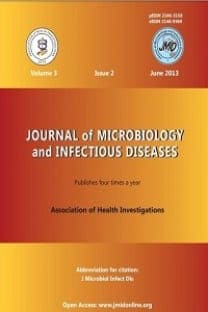Lactobacillus acidophilus Supplementation Restores Gut Epithelial Integrities and Barrier Functions in Non-specific Diarrhea
Lactobacillus acidophilus Supplementation Restores Gut Epithelial Integrities and Barrier Functions in Non-specific Diarrhea
mice, gut immunity, tight junctions, and adhesion molecules, Lactobacillus acidophilus supplementatio,
___
- 1. Wang J, Linnenbrink M, Kunzel S, et al. Dietary history contributes to enterotype-like clustering and functional metagenomic content in the intestinal microbiome of wild mice. Proc Natl Acad Sci USA 2014, 111(26): 2703-2710.
- 2. Lee SH. Intestinal permeability regulation by tight junction: implication on inflammatory bowel diseases. Intest Res 2015; 13(1): 11-18.
- 3. Turner JR. Intestinal mucosal barrier function in health and disease. Nat Rev Immunol 2009; 9(11): 799-809.
- 4. Gonzalez-Mariscal L, Betanzos A, Nava P, et al. Tight junction proteins. Prog Biophys Mol Biol 2003; 81(1): 1-44.
- 5. Montesi A, Garcia-Albiach R, Pozuelo MJ, et al. Molecular and microbiological analysis of caecal microbiota in rats fed with diets supplemented either with prebiotics or probiotics. Int J Food Microbiol 2005; 98(3): 281-289.
- 6. Johnson AM, Kaushik RS, Hardwidge PR. Disruption of transepithelial resistance by enterotoxigenic Escherichia coli. Vet Microbiol 2010; 141(1-2): 115-119.
- 7. Chung H, Kasper DL. Microbiota-stimulated immune mechanisms to maintain gut homeostasis. Curr Opin Immunol 2010; 22(4): 455-460.
- 8. Rousseaux C, Thuru X, Gelot A, et al. Lactobacillus acidophilus modulates intestinal pain and induces opioid and cannabinoid receptors. Nat Med 2007; 13(1): 35-37.
- 9. Wong JM, de Souza R, Kendall CW, et al. Colonic health: fermentation and short chain fatty acids. J Clin Gastroenterol 2006; 40(3): 235-243.
- 10. Gaschott T, Steinhilber D, Milovic V, et al. Tributyrin, a stable and rapidly absorbed prodrug of butyric acid, enhances antiproliferative effects of dihydroxycholecalciferol in human colon cancer cells. J Nutr 2001; 131(6): 1839-1843.
- 11. Savkovic SD, Villanueva J, Turner JR, et al. Mouse model of enteropathogenic Escherichia coli infection. Infect Immun 2005; 73(2): 1161-1170.
- 12. Mohawk KL, O'Brien AD. Mouse models of Escherichia coli O157:H7 infection and shiga toxin injection. J Biomed Biotechnol 2011; 2011: 258185.
- 13. Yoseph BP, Klingensmith NJ, Liang Z, et al. Mechanisms of Intestinal Barrier Dysfunction in Sepsis. Shock 2016; 46(1):52-59.
- 14. Hossain FMA, Park SO, Kim HJ, et al. CCR5 attenuates neutrophilic airway inflammation exacerbated by infection with rhinovirus. Cell Immunol 2020 351:104066.
- 15. Suzuki T. Regulation of intestinal epithelial permeability by tight junctions. Cell Mol Life Sci 2013; 70(4): 631-659.
- 16. Mennigen R, Nolte K, Rijcken E, et al. Probiotic mixture VSL#3 protects the epithelial barrier by maintaining tight junction protein expression and preventing apoptosis in a murine model of colitis. Am J Physiol Gastrointest Liver Physiol 2009; 296(5): 1140-1149.
- 17. Schultz M, Linde HJ, Lehn N, et al. Immunomodulatory consequences of oral administration of Lactobacillus rhamnosus strain GG in healthy volunteers. J Dairy Res 2003; 70(2): 165-173.
- 18. Montalto M, Maggiano N, Ricci R, et al. Lactobacillus acidophilus protects tight junctions from aspirin damage in HT-29 cells. Digestion 2004; 69(4): 225-228.
- 19. Galdeano CM, de Moreno de LeBlanc A, Vinderola G, et al. Mechanisms of immunomodulation induced by probiotic bacteria. Clin Vaccine Immunol 2007; 14(5): 485-492.
- 20. McFarland LV. Meta-analysis of probiotics for the prevention of traveler's diarrhea. Travel Med Infect Dis 2007; 5(2): 97-105.
- 21. Resta-Lenert S, Barrett KE. Live probiotics protect intestinal epithelial cells from the effects of infection with enteroinvasive Escherichia coli (EIEC). Gut 2003; 52(7): 988-997.
- 22. Parassol N, Freitas M, Thoreux K, et al. Lactobacillus casei DN-114 001 inhibits the increase in paracellular permeability of enteropathogenic Escherichia coli-infected T84 cells. Res Microbiol 2005; 156(2): 256-262.
- 23. Sartor RB. Cytokines in intestinal inflammation: pathophysiological and clinical considerations. Gastroenterology 1994; 106(2): 533-539.
- 24. Scully P, McKernan DP, Keohane J, et al. Plasma cytokine profiles in females with irritable bowel syndrome and extra-intestinal co-morbidity. Am J Gastroenterol 2010; 105(10): 2235-2243.
- 25. Nataro JP, Guerrant RL. Chronic consequences on human health induced by microbial pathogens: Growth faltering among children in developing countries. Vaccine 2017; 35: 6807-6812.
- 26. Azad MAK, Sarker M, Wan D. Immunomodulatory Effects of Probiotics on Cytokine Profiles. Biomed Res Int 2018; 2018: 8063647.
- 27. Rojas-Cartagena C, Flores I, Appleyard CB. Role of tumor necrosis factor receptors in an animal model of acute colitis. Cytokine 2005; 32(2): 85-93.
- 28. Sainathan SK, Hanna EM, Gong Q, et al. Granulocyte macrophage colony-stimulating factor ameliorates DSS-induced experimental colitis. Inflamm Bowel Dis 2008; 14(1): 88-99.
- 29. Jeengar MK, Thummuri D, Magnusson M, et al. Uridine Ameliorates Dextran Sulfate Sodium (DSS)-Induced Colitis in Mice. Sci Rep 2017; 7(1) :3924.
- ISSN: 2146-3158
- Yayın Aralığı: 4
- Başlangıç: 2011
- Yayıncı: Sağlık Araştırmaları Derneği
Esmeray MUTLU YILMAZ, Eda KOKSAL, Gökhan UNVER, Sercan SERİN
Hossain Ferdaus Mohd ALTAF, Sumaiya Islam FARZANA, Khan PARVEZ, Zahran EMAN, Atif Shaikh MUHAMMAD, Uddin Md NAZIM, Zinnah Kazi Mohammad ALİ, Khan IMDAD ULLAH, Rahman Md MASUDUR
Disseminated Fusariosis with Secondary Hemophagocytic Lymphohistiocytosis
Garima NİRMAL, Guruprasad Chellappan SOJAMANİ, Manjusha NAİR, Swapna R. NATH, Priyakumari THANKAMONY
Floral Differences of Conjunctiva in Patients with Renal Diseases
Lokman ASLAN, Sumeyra KOCTURK, Mustafa GÜL, Murat ASLANKURT, Orcun ALTUNOREN
Miliary Tuberculosis Mimicking Multiple Myeloma: A Rare Case
Jaspreet KAUR, Tagru RAJU, Yuvraj Singh CHEEMA, Jasmine SİNGH
Efficiency of Real-Time PCR in the Diagnosis of Community-Acquired Bacterial Meningitis in Children
Shahid RAZA, Bimal DAS, Rama CHAUDHRY, Vinay GOYAL, Rakesh LODHA, Seema SOOD, Hitender GAUTAM, Arti KAPİL
